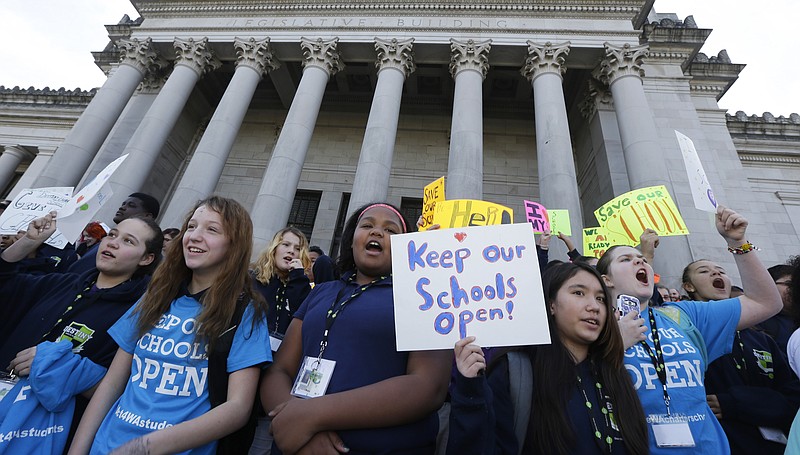WASHINGTON (AP) - Support for opening more charter schools has dropped significantly among Americans, but there's less opposition to expanding private school voucher programs, as the Trump administration continues its push for school choice, according to a survey released Tuesday.
Thirty-nine percent of respondents want to see more charters - schools that are funded by public money, but usually operated independently of school districts - according to a study by Education Next, a journal published by Harvard's Kennedy School and Stanford University. That's down from 51 percent last year.
President Donald Trump campaigned on a promise to dramatically expand school choice, and his Education Secretary Betsy DeVos made that her top priority. However, some charter school supporters had feared Trump's polarizing rhetoric could actually hurt the school-choice movement.
However, the authors of the report said the decline in support for charters can't be linked directly to Trump. They said support for charters slipped almost equally across party lines: by 11 percent among Democrats and by 13 percent among Republicans.
They also emphasize private school vouchers and voucher-type programs, championed by Trump, have seen stable support and declining opposition. Finally, when respondents were told that Trump was advocating for charter schools, overall support increased by 6 percentage points.
"We can't say definitively what is responsible for the decline," said Martin West, associate professor of education at Harvard University and a co-author of the report. West speculated the drop may have been caused by continued opposition from teachers unions and many Democrats plus debates over charters' effectiveness.
"These developments may have led to a souring of the charter brand," West said.
At the same time, opposition to publicly funded vouchers that help parents pay private school tuition dropped from 44 percent last year to 37 percent; 45 percent of respondents currently favor the idea. When it comes to tax credit-funded scholarships for private schools, resistance fell from 29 percent to 24 percent, while support was at 54 percent now.
"The data shows that the majority of parents still want more and better options when it comes to education for their kids," Education Department press secretary Liz Hill said.
Proponents of charter schools are not discouraged by the study. Nina Rees, president of the National Alliance for Public Charter Schools, blamed the dropping support on "expensive, sustained, and coordinated campaigns to discredit charter schools, led by teachers' unions and special interests."
Rees said more than 300 public charter schools opened last year, with a total of more than 6,900 charter schools serving more than 3 million students across the country. In the 2013-14 school year, more than 1 million students were waitlisted for charter schools, according to the group.
"The opinions about charter schools that matter most are the opinions of parents and students who have chosen charter schools," Rees said.
To others, the Trump effect is more apparent. On the campaign trail, Trump spoke of funding a $20 billion school choice program and has proposed major cuts to long-standing K-12 programs, such as teacher preparation and after-school classes, while requesting more funding for charters and vouchers. DeVos has faced criticism from the left for promoting solely school choice and paying little attention to public schools.
Robin Lake, director of the Center on Reinventing Public Education, a non-partisan research and policy organization, said the Trump administration's rhetoric has only deepened partisan tensions around charter schools.
"I would be shocked if it were unaffected," Lake said. "I am just hearing a lot from folks on the ground that schools have a lot of conversations with parents that they didn't use to have about why charter schools are public and why they are not a partisan issue."
"I am not sure it's not the only reason, but I am pretty sure it's a contributing factor."
Rick Hess, director of education policy at the conservative American Enterprise Institute, said Trump and DeVos may have turned school choice into a much more federal and divisive issue than it needed to be by talking about it in black-and-white terms and by being too critical of public schools.
"Sometimes the way these things get talked about, you can wind up alienating people who might be with you," Hess said.

